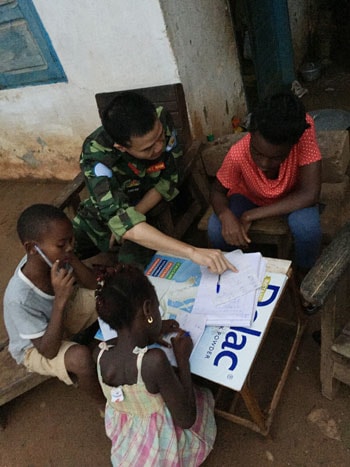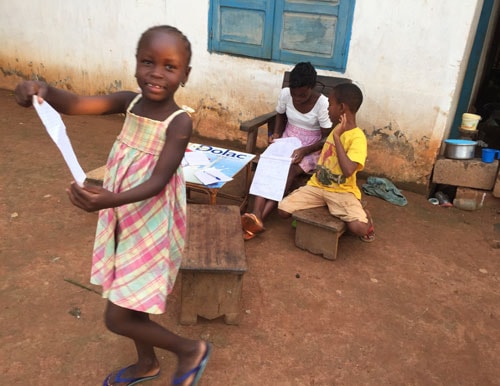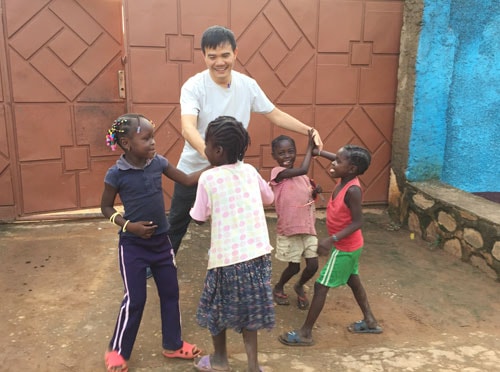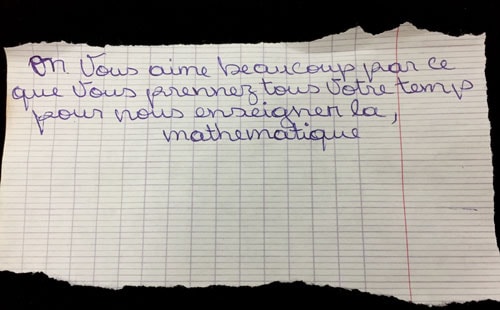Vietnamese peacekeeping officer class in Central Africa
The class usually started in the late afternoon and lasted until people's faces were no longer visible, mosquitoes buzzing above the heads and feet of the teacher and the four children.
At 5 p.m., the bus of the United Nations Peacekeeping Mission in the Central African Republic (MINUSCA) took the officers back to their lodgings after a day of work. Arriving at a small alley in Ward 3, District 3 of the capital Bangui, the bus stopped. A soldier in a green beret, in camouflage uniform, with the words "Viet Nam" embroidered on his chest, got out. It was Lieutenant Colonel Le Ngoc Son. He quickly walked into the alley.
Seeing his shadow, the children playing tag on the street rushed over. Little Angelina was the fastest, running to hug the teacher's legs. In the yard, three other children, Choula (15 years old), Benita (13 years old) and Emmanuel (10 years old) had arranged tables and chairs, laid out paper and pens, and prepared to study.
 |
Classroom with small table and some "mobile" chairs in the corner of the yard. |
Mr. Son checked the previous lesson with calculations, then taught the new lesson. The class had no blackboard or chalk, just four chairs, a table, four Central African students and a Vietnamese teacher. The children studied while scratching themselves from mosquito bites.
The lesson ended when darkness fell, the children could not see the letters clearly. Mosquitoes still came in swarms, buzzing under their feet and above their heads. Mosquitoes here can carry the dangerous disease malaria.
While the children were clearing the tables, chairs, papers and pens, Angelina asked the teacher if they could continue the lesson tomorrow. When she learned that the teacher was busy on duty, she asked again, happy to know that the lesson schedule was set for the day after tomorrow. To help the children understand, Mr. Son tried to use some newly learned French words to express his thoughts. Because he spoke English, the children communicated in French and Sango (the local language).
Every week, the Vietnamese officer spends about 4-5 afternoons, after finishing work at the Mission, teaching four children. The class has been maintained for nearly half a year now.
At the end of the lesson,Lieutenant Colonel Son walked back to his boarding house about a kilometer away. Darkness covered the streets. The capital Bangui was not much different from many parts of the Vietnamese countryside.."The place where we rent a room only has electricity for a few hours a day, there are absolutely no lights. People are used to that," he explained. This area once had a power outage for more than a month. And the electricity in the rooming house also comes from batteries.
Lieutenant Colonel Son was sent by the Vietnam Peacekeeping Center to work at the MINUSCA Mission in April, along with two Captains Ho Tien Hung and Dinh Duc Long. He is a staff officer at the Military Operations Center, tasked with receiving and processing information about the military situation throughout the Central African Republic and reporting to the United Nations headquarters in New York (USA). He also holds key positions in the Mission, which serves as a basis for commanders to make operational decisions. Currently, Vietnam has five officers working here for a one-year term.
 |
Angelina - the youngest student in the class showed off finding a piece of paper in a pile of old notebooks. |
Classroom "lack of books, too many mosquitoes"
In Bangui, the Vietnamese officers lived in a rented house a few kilometers from the Mission, along with a number of other staff. Opposite the house was a family selling firewood. In his free time, Lieutenant Colonel Son often went over to chat and play with the family’s one-year-old child. Occasionally, he helped them chop firewood to sell.
One day in mid-April, he met Annie and her daughter Choula who came to buy firewood. Seeing the heavy bundle, he offered to help carry it to their home, which was more than half a kilometer away. Annie’s family lived with three other households in a 50-square-meter house with a large yard and garden. They did not have a kitchen and usually cooked in front of the house.
Annie’s three children are Choula, Emmanuel and Angelina. Choula is 15 years old and is in the equivalent of 7th grade in Vietnam. Civil war, violence and ethnic conflicts have disrupted her access to school. She had to stay home for two years.
Seeing that, Lieutenant Colonel Son suggested to Annie that he tutor Choula in Math and English. In Vietnam, he had taught for many years at the Military Technical Academy, before transferring to the Vietnam Peacekeeping Center. Annie agreed, and Mr. Son had his first student.
When he first started, Mr. Son tried to tell Choula to show him her textbooks so he could know what she was studying so that he could have a suitable teaching program. He was "shocked" when Choula brought out a French book with content "equivalent to university level in Vietnam". It turned out that it was not Choula's textbook but a university textbook she brought back from somewhere.
"Language barrier becomes the biggest obstacle for teachers and students," he said.
 |
The children "dance" with the teacher. |
In the early days, Choula could not add, subtract, multiply, or divide two integers with opposite signs. She did not understand how to calculate with both multiplication and division, and addition and subtraction even though she was in 7th grade. Teacher Son had to start with the simplest knowledge, from adding and subtracting two one-digit numbers, then gradually increase to two-digit, three-digit numbers...
Every time he taught a lesson, in addition to English and self-taught French, the teacher had to use gestures to express himself. At the end of the lesson, his jaw muscles often ached from talking too much, and his limbs were tired. In return, Choula understood the lesson and could do calculations. She also taught the teacher French and Sango.
After a month, Choula asked Mr. Son to let Benita, who lived more than a kilometer away, come and study with him. She was in 8th grade and had to stay home for a year. A few days later, Emmanuel and Angelina joined the class.
All four students had no textbooks or notebooks. Their parents went to buy them three times, but they were all in short supply. One time, the Vietnamese teacher was stunned when he saw Angelina boasting that she had found a piece of paper with a few blank lines. She had found it in a pile of old notebooks, and was trying to separate it to see if it was two sheets stuck together. The next day, Angelina was given a notebook and a pen by Mr. Son.
After two months of perseverance, the children learned to do simple to more difficult calculations. Apart from the afternoon "remedial" classes, the children still went to school regularly. If the fighting was unlucky enough to last for a month, they would stay home.
Teaching is also a way to keep peace
The class with four children brought Lieutenant Colonel Son many joys and memories in his life. At the party with the participation of 40 Mission officers a week ago, his colleagues asked the Vietnamese officer how he felt about life here after half a year of duty. Listening to him talk about the joy of teaching and showing pictures of children still studying when it was getting dark, the corner of the party became lively, attracting everyone's attention. They happily called him "teacher". At the end of the party, those who left first came to his table to greet him and send their best wishes to the students.
A memorable memory was just recently, after the class on September 21. He received a piece of paper written in French, somewhat scribbled, from his students: "On vous aime beaucoup parce que vous prennez tous votre temp pour us enseigner la, mathematique". Roughly translated: "We love you very much because you spend all your time teaching us math".
 |
The words written on the torn page that the students sent to "teacher" Son. |
For the past four years, the country of nearly 5 million people has been in a civil war that has killed thousands of people and forced hundreds of thousands to seek refuge in neighboring countries. Many humanitarian organizations have been present, helping refugees, supporting education and skills necessary for life.
For UN peacekeeping forces, the most important task is to protect civilians. The UN also stipulates that officers are not allowed to give children food or money.
"I want to help the children, but I cannot do it through humanitarian activities like in Vietnam, but I can bring knowledge through teaching. The biggest wish of the peacekeeping force is for the children to go to school, have a classroom with a blackboard, white chalk, and no longer have to worry about being attacked or having to flee their homes," the father of a school-age child shared.
In 2014, the Peacekeeping Center was established, marking Vietnam's official entry into the United Nations peacekeeping force. From the first two officers, Vietnam has so far sent 19 officers to serve as liaison officers, staff officers and military observers at the United Nations Peacekeeping Mission in South Sudan and the Central African Republic. This year, Vietnam has sent 7 officers to perform missions. It is expected that in early 2018, the Level 2 Field Hospital with a staff of 70 people and modern equipment will participate in peacekeeping operations in South Sudan. Peacekeeping officers are "one in a hundred" people. In addition to understanding international law and local customs, and complying with the principles set forth by the United Nations when performing their duties, they must study while working, taking advantage of the prestige of the country and the Vietnamese army to convince forces and factions to accept collaboration in solving problems that the United Nations needs to deploy in the area. |
According to VNE
| RELATED NEWS |
|---|

